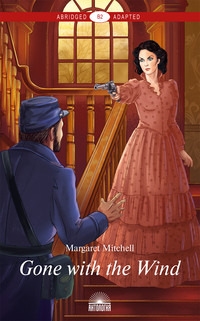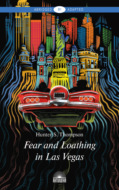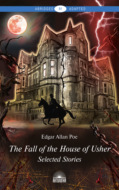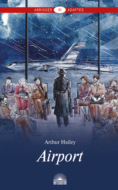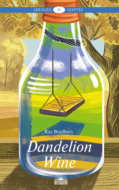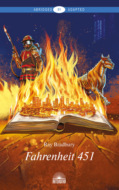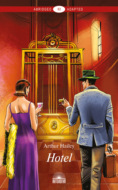Kitap dosya olarak indirilemez ancak uygulamamız üzerinden veya online olarak web sitemizden okunabilir.
Kitabı oku: «Gone with the Wind / Унесённые ветром», sayfa 3
Chapter V
It was ten o’clock in the morning. The day was warm for April and the golden sunlight streamed into Scarlett’s room through the blue curtains of the wide windows.
“Thank God, it isn’t raining.” On the bed lay the applegreen, silk ball dress, neatly packed in a large cardboard box. It was ready to be carried to Twelve Oaks to be put on before the dancing began. If her plans were successful, she would not wear that dress tonight. Long before the ball began, she and Ashley would be on their way to Jonesboro to be married. The troublesome question was – what dress should she wear to the barbecue?
What dress would best set off her charms and make her most irresistible to Ashley? Since eight o’clock she had been trying on dresses.
There remained a colored cotton dress which Scarlett felt was not festive enough for the occasion. It was not suitable for a barbecue, for it had only tiny puff ed sleeves and the neck was low enough for a dancing dress. But there was nothing else to do but wear it. After all she was not ashamed of her neck and arms and bosom, even if it was not correct to show them in the morning.
As she stood before the mirror, she thought that there was absolutely nothing about her figure to cause her shame. Her neck was short but rounded and her arms plump. Her breasts, pushed high by her stays, were very nice breasts. What a pity legs could not be shown, she thought. And as for her waist – there was no one in Fayetteville, Jonesboro or in three counties, who had so small a waist.
The thought of her waist brought her back to practical matters. Mammy would have to lace her tighter. She pushed open the door and shouted for her impatiently.
Mammy entered puffing. In her large black hands was a tray upon which food smoked. In the excitement of trying on dresses Scarlett had forgotten Mammy’s rule that, before going to any party, the O’Hara girls must be crammed so full of food at home they would be unable to eat any refreshments at the party.
“It’s no use. I won’t eat it. You can just take it back to the kitchen. I’m going to have a good time today and eat as much as I please.”
At this heresy, Mammy frowned with indignation.
“Besides, at the last barbecue, Ashley Wilkes told me he liked to see a girl with a healthy appetite.”
Mammy shook her head.
“Whut gempmums says an’ whut dey thinks is two diffunt things. An’ Ah ain’ noticed Mist’ Ashley axing fer ter mahy you.”
Scarlett started to speak sharply and then caught herself. Seeing the look on Scarlett’s face, Mammy picked up the tray and changed her tactics. As she started for the door, she sighed.
“Well’m, awright. You kin sho tell a lady by whut she doan eat. Ah ain’ seed no w’ite lady who et less’n Miss Melly Hamilton did las’ time she wuz visitin’ Mist’ Ashley’ – Ah means, visitin’ Miss India.”
Scarlett looked at her suspiciously, but Mammy’s broad face carried only a look of innocence and of regret that Scarlett was not the lady Melanie Hamilton was.
“Put down that tray and come lace me tighter,” said Scarlett irritably. “And I’ll try to eat a little afterwards. If I ate now I couldn’t lace tight enough.”
Happy with her triumph, Mammy set down the tray.
“Whut mah lamb gwine wear?”
“That,” answered Scarlett, pointing at the fluff y mass of green flowered muslin. Mammy sighed. Between the two evils16, it was better to let Scarlett wear an afternoon dress at a morning barbecue than to let her gobble like a hog17.
Having the laced dress on, Scarlett obediently sat down before the tray, wondering if she would be able to get any food into her stomach and still have room to breathe.
“I wish to Heaven I was married. I’m tired of being unnatural and never doing anything I want to do. I’m tired of acting like I don’t eat more than a bird, and walking when I want to run and saying I feel faint after a waltz, when I could dance for two days and never get tired. I’m tired of saying, ‘How wonderful you are!’ to fool men, and I’m tired of pretending I don’t know anything, so men can tell me things and feel important while they’re doing it.”
The carriage was taking Scarlett and her sisters down the red road toward the Wilkes plantation. Gerald rode beside the carriage on his big hunter, warm with brandy and pleased with himself that he had dismissed Jonas Wilkerson that morning so speedily. He was happy, pleasantly excited over the prospect of spending the day shouting about the Yankees and the war, and proud of his three pretty daughters. He gave no thought to his conversation of the day before with Scarlett, for it had completely slipped his mind. He only thought that she was pretty and a great credit to him and that, today, her eyes were as green as the hills of Ireland.
Scarlett, looking at him, knew that he would be very drunk by sundown. Coming home in the dark, he would try, as usual, to jump every fence between Twelve Oaks and Tara and, she hoped, would escape breaking his neck. He would ruin his new gray suit and tell Ellen how his horse fell off the bridge in the darkness – a lie which would fool no one.
Scarlett felt so excited and happy this morning that she included the whole world, as well as Gerald, in her affection. She was pretty and she knew it; she would have Ashley for her own before the day was over; the sun was warm and tender and the glory of the Georgia spring was spread before her eyes.
“I’ll remember how beautiful this day is till I die,” thought Scarlett. “Perhaps it will be my wedding day!”
And she thought how she and Ashley might ride swiftly through this beauty of blossom and greenery this very afternoon, or tonight by moonlight, toward Jonesboro and a preacher. Of course, she would have to be remarried by a priest from Atlanta. She knew Ellen would be shocked at hearing that her daughter had eloped with another girl’s fiancé but would forgive her when she saw her happiness. And Gerald would scold and bawl but finally he would be pleased at a union between his family and the Wilkes.
“But that’ll be something to worry about after I’m married,” she thought, waving the worry away from her.
As they neared the intersecting road, the sound of hooves and carriage wheels became heard and feminine voices sounded from behind the trees. Gerald, riding ahead, pulled up his horse and signed to Toby to stop the carriage where the two roads met.
“’Tis the Tarleton ladies,” he announced to his daughters, smiling, for excepting Ellen there was no lady in the County he liked more than the red-haired Mrs. Tarleton. “And ’tis herself at the reins. Ah, there’s a woman with fine hands for a horse!”
He stood up in his stirrups and took off his hat, as the Tarleton carriage, filled with girls in bright dresses and parasols came into view, with Mrs. Tarleton on the box as Gerald had said. With her four daughters, their mammy and their ball dresses in long cardboard boxes, there was no room for the coachman. And, besides, Beatrice Tarleton never willingly permitted anyone, black or white, to hold reins. She had borne eight children, as red of hair and as full of life as she, and had raised them most successfully, because she gave them all the loving neglect and the stern discipline she gave the colts she bred.
She loved horses and talked horses constantly. She understood them and handled them better than any man in the County.
She waved her whip when she saw Gerald and stopped the horses. To a casual observer it would seem that years had passed since the Tarletons had seen the O’Haras, instead of only two days. But they were a sociable family and liked their neighbors, especially the O’Hara girls. That is, they liked Suellen and Carreen. No girl in the County really liked Scarlett.
“That’s a fine bevy, Ma’m,” said Gerald gallantly. “But it’s far they’ll go to beat their mother.”
Mrs. Tarleton rolled her red-brown eyes in appreciation, and the girls cried, “Ma, stop making eyes or we’ll tell Pa!” “I vow, Mr. O’Hara, she never gives us a chance when there’s a handsome man like you around!”
Scarlett laughed with the rest at these jokes but, as always, the freedom with which the Tarletons treated their mother came as a shock. They acted as if she were one of themselves and not a day over sixteen. To Scarlett, the very idea of saying such things to her own mother was impossible. And yet – and yet – there was something very pleasant about the Tarleton girls’ relations with their mother.
“Where’s Ellen this morning?” asked Mrs. Tarleton.
“She stayed home to go over the accounts with the dismissed overseer. Where’s himself and the lads?”
“Oh, they rode over to Twelve Oaks hours ago – to sample the punch and see if it was strong enough, I dare say! I’m going to ask John Wilkes to keep them overnight, even if he has to bed them down in the stable. Five drunk men are just too much for me. Up to three, I do very well but —”
Gerald hastily interrupted to change the subject. And he was glad when Mrs. Tarleton did it.
“My girls have been so excited,” said Mrs. Tarleton, “ever since we heard the news this morning about Ashley and that little cousin of his from Atlanta. What’s her name? Melanie? Bless the child, she’s a sweet little thing. Everybody’s known for years that Ashley would marry her. Just like Honey Wilkes is going to marry Melanie’s brother, Charles. Now, tell me, Mr. O’Hara, is it illegal for the Wilkes to marry outside of their family? Because if —”
Scarlett did not hear the rest of the words. For one short instant, it was as though the sun had ducked behind a cloud, leaving the world in shadow, taking the color out of things. The freshly green foliage looked faded and dreary. Scarlett dug her fingers into the upholstery of the carriage. It was one thing to know that Ashley was engaged but it was another to hear people talk about it so casually. Then her courage floated back and the sun came out again. She knew Ashley loved her. That was certain. And she smiled as she thought how surprised Mrs. Tarleton would be when no engagement was announced that night – how surprised if there were an elopement.
“I don’t care what you say, Mr. O’Hara,” Mrs. Tarleton was saying emphatically. “It’s all wrong, this marrying of cousins. It’s bad enough for Ashley to be marrying the Hamilton child. Cousins shouldn’t marry, even second cousins. It weakens the strain. It isn’t like horses. In people it just doesn’t work. You —”
“Now, Ma’m, I disagree with you on that! Can you name me better people than the Wilkes? And they’ve been intermarrying since long ago.”
“And high time they stopped it, for it’s beginning to show. Oh, not Ashley so much, for he’s a good-looking devil, though even he – But look at those two washed-out-looking Wilkes girls, poor things! Nice girls, of course, but washed out. And look at little Miss Melanie. Thin as a rail18 and delicate enough for the wind to blow away and no spirit at all. Not a notion of her own. ‘No, Ma’m!’ ‘Yes, Ma’m!’ That’s all she has to say. You see what I mean? That family needs new blood, fine vigorous blood like my red heads or your Scarlett. Now, don’t misunderstand me. The Wilkes are fine folks in their way, and you know I’m fond of them all, but be frank! I believe the stamina has been bred out of them. And their intermarrying has made them different from other folks around here. Always fiddling with the piano or sticking their heads in a book. I do believe Ashley would rather read than hunt! And just look at the bones on them. Too slender.
“I know what I’m talking about. And when my family wanted me to marry a second cousin, I bucked like a colt. I said, ‘No, Ma. Not for me.’ Well, Ma fainted, but I stood firm and Grandma backed me up. She knew a lot about horse breeding too, you see, and said I was right. And she helped me run away with Mr. Tarleton. And look at my children! Big and healthy and not a sickly one. Now, the Wilkes —”
“Good Heavens, Ma, do let’s get on!” Betty Tarleton cried impatiently. “This sun is broiling me.”
“Just a minute, Ma’m, before you go,” broke in Gerald hurriedly. “Not meaning to change the subject. But what have you decided to do about selling us the horses for the Troop? War may start any day now. But you are still refusing to sell us your fine beasts.”
“Maybe there won’t be any war,” Mrs. Tarleton said.
“But it’s breaking me heart to see such a fine pretty lady so stingy with her beasts! Now, where’s your patriotism, Mrs. Tarleton? Does the Confederacy mean nothing to you at all?”
“Now, listen to me, Gerald O’Hara,” she said. “Don’t you go throwing the Confederacy in my face! I think the Confederacy means as much to me as it does to you, me with four boys in the Troop and you with none. But my boys can take care of themselves and my horses can’t. I’d gladly give the horses free of charge if I knew they were going to be ridden by boys I know, gentlemen used to thoroughbreds. No, I wouldn’t hesitate a minute. But let my beauties be at the mercy of back-woodsmen who are used to riding mules! No, sir! Do you think I’d let ignorant fools ride my tender darlings and beat them till their spirits were broken? Why, I’ve got goose flesh this minute, just thinking about it! No, Mr. O’Hara, you’re mighty nice to want my horses, but you’d better go to Atlanta and buy some old plugs for your clodhoppers. They’ll never know the difference.”
“That’s a fine woman,” said Gerald, putting on his hat and taking his place beside his own carriage. “Drive on, Toby. Of course, she’s right. If a man’s not a gentleman, he’s no business on a horse. The infantry is the place for him. But more’s the pity, there’s not enough planters’ sons in this County to make up a full troop. What did you say, Puss?”
“Pa, please ride behind us or in front of us. You kick up such a heap of dust that we’re choking,” said Scarlett, who felt that she could endure conversation no longer. It distracted her from her thoughts and she was very anxious to arrange both her thoughts and her face in attractive lines before reaching Twelve Oaks.
Chapter VI
They crossed the river and the carriage mounted the hill. Even before Twelve Oaks came into view Scarlett saw smoke and smelled burning logs and roasting pork and mutton.
Scarlett loved Twelve Oaks even more than Tara, for it had a dignity that Gerald’s house did not possess.
The driveway was full of horses and carriages and guests alighting and calling greetings to friends. The wide hall which ran from front to back of the house was full of people, and Scarlett saw girls in crinolines, bright as butterflies, going up and coming down the stairs from the second fl oor, arms about each other’s waists, laughing and calling to young men in the hall below them.
Through the open French windows, she saw the older women seated in the drawing room, in dark silks fanning themselves and talking of babies and sicknesses and who had married whom and why.
The sunny front veranda was filled with guests. Yes, the whole County was here, thought Scarlett.
On the porch steps stood John Wilkes, silver-haired, radiating the quiet charm and hospitality. Beside him Honey Wilkes fidgeted and giggled as she called greetings to the arriving guests. Her sister India was nowhere to be seen, but Scarlett knew she probably was in the kitchen giving final instructions to the servants. Poor India, thought Scarlett, she’s had so much trouble keeping house since her mother died.
Frank Kennedy was hurrying to the carriage to assist Suellen. He might own more land than anyone in the County and might have a very kind heart, but he was forty. However, remembering her plan, Scarlett cast such a smile of greeting at him that he stopped short, his arm outheld to Suellen.
Scarlett’s eyes searched the crowd for Ashley. Where was he? And Melanie and Charles?
As she chattered and laughed, her eyes fell on a stranger, standing alone in the hall, staring at her in an impertinent way. He looked quite old, at least thirty-five. He was a tall man and powerfully built. Scarlett thought she had never seen a man with such wide shoulders, so heavy with muscles. When her eye caught his, he smiled, showing white teeth below a black mustache. He was dark of face. There was a cynical humor in his mouth as he smiled at her, and Scarlett caught her breath. She felt that she should be insulted by such a look and was annoyed with herself because she did not feel insulted. She did not know who he could be, but there was a look of good blood in his dark face.
She dragged her eyes away from his without smiling back, and he turned as someone called: “Rhett! Rhett Butler! Come here!”
Rhett Butler? The name had a familiar sound, somehow connected with something pleasantly scandalous, but her mind was on Ashley and she dismissed the thought.
“I must run upstairs and smooth my hair,” she told Stuart and Brent, who were trying to get her cornered from the crowd.
Scarlett started up the wide stairs. As she did, a shy voice behind her called her name and, turning, she saw Charles Hamilton. He was a nice-looking boy with soft brown curls and deep brown eyes. A faint blush went over his face for he was timid with girls.
“Why, Charles Hamilton, you handsome old thing, you! I’ll bet you came all the way down here from Atlanta just to break my poor heart!”
Charles almost stuttered, holding her warm little hands in his and looking into the dancing green eyes. This was the way girls talked to other boys but never to him. They always treated him like a younger brother. Even with Honey, who he was going to marry when he came into his property next fall, he was shy and silent. And here was Scarlett O’Hara teasing him about breaking her heart!
“Now, you wait right here till I come back, for I want to eat barbecue with you. And don’t you go off flirting with other girls, because I’m mighty jealous,” came the incredible words from red lips with a dimple on each side.
Tapping him lightly on the arm with her folded fan, she turned to start up the stairs and her eyes again fell on the man called Rhett Butler who stood alone a few feet away from Charles. Evidently he had overheard the whole conversation, for he grinned up at her.
In the bedroom, she found Cathleen Calvert standing before the mirror and biting her lips to make them look redder.
“Cathleen,” said Scarlett, “who is that nasty man downstairs named Butler?”
“My dear, he isn’t received!”
Scarlett digested this in silence, for she had never before been under the same roof with anyone who was not received. It was very exciting.
“What did he do?”
“Oh, Scarlett, he has the most terrible reputation. His name is Rhett Butler and he’s from Charleston and his folks are some of the nicest people there, but they won’t even speak to him. He was expelled from West Point. Imagine! And then there was that business about the girl he didn’t marry.”
“Do tell me!”
“Darling, don’t you know anything? Well, this Mr. Butler took a Charleston girl out buggy riding. And, my dear, they stayed out nearly all night and walked home finally, saying the horse had run away and they had gotten lost in the woods. And he refused to marry her the next day!”
“Oh,” said Scarlett.
“He said he hadn’t – er – done anything to her and he didn’t see why he should marry her. And, of course, her brother called him out, and Mr. Butler said he’d rather be shot than marry a stupid fool. And so they fought a duel and Mr. Butler shot the girl’s brother and he died, and Mr. Butler had to leave Charleston and now nobody receives him,” finished Cathleen triumphantly.
Scarlett sat on a high ottoman, under the shade of a huge oak in the back of the house. She had chosen to sit apart so she could gather about her as many men as possible.
She had never been more miserable in her life, for her plans of last night had failed utterly so far as Ashley was concerned. He had made no attempt to join the circle about her, in fact she had not had a word alone with him since arriving, or even spoken to him since their first greeting. He welcomed her when she came into the back garden, but Melanie had been on his arm then, Melanie who hardly came up to his shoulder.
She had smiled when she greeted Scarlett and told her how pretty her green dress was. Since then, Ashley had sat on a stool at Melanie’s feet and talked quietly with her, smiling the slow smile that Scarlett loved.
Scarlett tried to keep her eyes from these two but could not, and after each glance she redoubled her flirting with her cavaliers. But Ashley did not seem to notice her at all. He only looked up at Melanie and talked on, and Melanie looked down at him with an expression that she belonged to him.
So, Scarlett was miserable.
As her eyes wandered from Melanie, she caught the gaze of Rhett Butler, who was not mixing with the crowd but standing apart talking to John Wilkes. He had been watching her and when she looked at him he laughed outright. Scarlett had an uneasy feeling that this man who was not received was the only one present who knew what lay behind her wild gaiety and found that amusing. She could have clawed him with pleasure.
“If I can just live through this barbecue till this afternoon,” she thought, “all the girls will go upstairs to take naps to be fresh for tonight and I’ll stay downstairs and get to talk to Ashley. Surely he must have noticed how popular I am.” She had another hope: “Of course, he has to be attentive to Melanie because, after all, she is his cousin and she isn’t popular at all, and if he didn’t look out for her she’d just be a wallflower.”
Charles Hamilton was now firmly planted on her right. He held her fan in one hand and his untouched plate of barbecue in the other and stubbornly refused to meet the eyes of Honey. Scarlett took new courage and redoubled her efforts in the direction of Charles. It was a wonderful day for Charles, a dream day, and he had fallen in love with Scarlett with no effort at all.
When the last forkful of pork and chicken and mutton had been eaten, Scarlett hoped the time had come when India would rise and suggest that the ladies retire to the house. The barbecue was over and all were glad to have a rest while sun was at its height.
Conversation was dying out when everyone heard Gerald’s voice. Standing some little distance away from the barbecue tables, he was at the peak of an argument with John Wilkes.
“Pray for a peaceable settlement with the Yankees after we’ve fired on them at Fort Sumter? The South should show by arms that she cannot be insulted and that she is not leaving the Union by the Union’s kindness but by her own strength!”
“Oh, my God!” thought Scarlett. “He’s done it! Now, we’ll all sit here till midnight.”
In an instant, something electric went through the air. The men sprang from benches and chairs, voices raised to be heard above other voices. There had been no talk of politics or war all during the morning, because of Mr. Wilkes’ request that the ladies should not be bored. But now Gerald had bawled the words “Fort Sumter,” and every man forgot his host’s request.
“Of course we’ll fight —”
“Yankee thieves —”
“We could lick them in a month —”
“Why, one Southerner can lick twenty Yankees —”
“Teach them a lesson they won’t soon forget —”
“No, look how Mr. Lincoln insulted our Commissioners!”
“They want war; we’ll make them sick of war —”
And above all the voices, Gerald’s boomed. All Scarlett could hear was “States’ rights, by God!” shouted over and over. Gerald was having an excellent time, but not his daughter.
Secession, war – these words had become boring to Scarlett, but now she hated the sound of them, for they meant that the men would stand there for hours and she would have no chance to corner Ashley. Of course there would be no war and the men all knew it. They just loved to talk and hear themselves talk.
Charles Hamilton, finding himself alone with Scarlett, leaned closer and whispered a confession.
“Miss O’Hara – I – I had already decided that if we did fight, I’d go over to South Carolina and join a troop there.”
She could think of nothing to say and so merely looked at him, wondering why men were such fools as to think women interested in such matters.
“If I went – would – would you be sorry, Miss O’Hara?”
“I should cry into my pillow every night,” said Scarlett, meaning to be joking, but he took the statement at face value19 and went red with pleasure.
“Would you pray for me?”
“What a fool!” thought Scarlett.
“Would you?”
“Oh – yes, indeed, Mr. Hamilton. Three Rosaries a night, at least!”
“Miss O’Hara – I must tell you something. I – I love you!”
“Um?” said Scarlett absently, trying to peer through the crowd of men to where Ashley still sat talking at Melanie’s feet.
“Yes!” whispered Charles. “I love you! You are the most – the most beautiful girl I’ve ever known and the sweetest and the kindest and I love you with all my heart. I cannot hope that you could love anyone like me but, my dear Miss O’Hara, I will do anything in the world to make you love me. I will —”
Charles stopped, for he couldn’t think of anything difficult enough to really prove his love to Scarlett, so he said simply: “I want to marry you.”
Scarlett came back to earth at the sound of the word “marry.” She had been thinking of marriage and of Ashley, and she looked at Charles with irritation. She was used to men asking her to marry them, men much more attractive than Charles Hamilton. She only saw a boy of twenty, red as a beet and looking very silly. She wished that she could tell him how silly he looked. But automatically, the words Ellen had taught her to say rose to her lips and she murmured: “Mr. Hamilton, this is all so sudden that I do not know what to say.”
And Charles swallowed the bait20 eagerly: “I would wait forever! Please, Miss O’Hara, tell me that I may hope!”
Scarlett could hear Ashley and Melanie discussing Mr. Thackeray’s and Mr. Dickens’s works and it was so boring that the prospect looked bright to Scarlett and she turned beaming eyes on Charles and smiled.
“Ashley, you have not favored us with your opinion,” said Jim Tarleton, turning from the group of shouting men. There was no one there so handsome, thought Scarlett. Even the older men stopped to listen to his words.
“Why, gentlemen, if Georgia fights, I’ll go with her. Why else would I have joined the Troop?” he said. “But, like Father, I hope the Yankees will let us go in peace and that there will be no fighting.”
Of all the group there was only one who seemed calm. Scarlett’s eyes turned to Rhett Butler, who leaned against a tree, his hands shoved deep in his trouser pockets. He stood alone and had uttered no word as the conversation grew hotter. There was contempt in his black eyes – contempt, as if he listened to the braggings of children. He listened quietly until Stuart Tarleton repeated: “Why, we could lick them in a month! A month – why, one battle —”
“Gentlemen,” said Rhett Butler, not moving from his position against the tree or taking his hands from his pockets, “may I say a word?”
The group turned toward him.
“Has any one of you gentlemen ever thought that there’s not a cannon factory south of the Mason-Dixon Line? Or how few iron foundries there are in the South? Or woolen mills or cotton factories? Have you thought that we would not have a single warship and that the Yankee fleet could bottle up our harbors in a week, so that we could not sell our cotton abroad?”
“The trouble with most of us Southerners,” continued Rhett Butler, “is that we either don’t travel enough or we don’t profit enough by our travels. Now, of course, all you gentlemen are well traveled. But what have you seen? You’ve seen the hotels and the museums and the balls and the gambling houses. And you’ve come home believing that there’s no place like the South. As for me, I was Charleston born, but I have spent the last few years in the North. I have seen many things that you all have not seen. The thousands of immigrants who’d be glad to fight for the Yankees for food and a few dollars, the factories, the foundries, the shipyards, the iron and coal mines – all the things we haven’t got. Why, all we have is cotton and slaves and arrogance. They’d lick us in a month.”
For a tense moment, there was silence.
“Sir,” said Stuart Tarleton heavily, “what do you mean?”
Rhett looked at him with polite but mocking eyes.
“I mean,” he answered, “what Napoleon – perhaps you’ve heard of him? – remarked once, ‘God is on the side of the strongest battalion!’” and, turning to John Wilkes, he said with courtesy: “You promised to show me your library, sir. I fear I must go back to Jonesboro early this afternoon where a bit of business calls me.”
He faced the crowd, clicked his heels together and bowed like a dancing master. Then he walked across the lawn with John Wilkes, his black head in the air, and the sound of his laughter floated back to the group.
There was a startled silence and then the buzzing broke out again.
Ashley went over to where Scarlett and Charles sat, a thoughtful and amused smile on his face.
“Arrogant devil, isn’t he?” he observed, looking after Butler. “He looks like one of the Borgias21.”
Scarlett thought quickly but could remember no family in the County or Atlanta or Savannah by that name.
“I don’t know them. Is he kin to them? Who are they?”
An odd look came over Charles’ face, shame struggling with love. Love triumphed as he realized that it was enough for a girl to be sweet and beautiful, without having an education and he made swift answer: “The Borgias were Italians.”
“Oh,” said Scarlett, losing interest, “foreigners.”
She turned her prettiest smile on Ashley, but for some reason he was not looking at her. He was looking at Charles, and there was understanding in his face and a little pity.
Scarlett stood on the landing and looked over the banisters into the hall below. It was empty. From the bedrooms on the floor above came low voices, laughter and, “Now, you didn’t, really!” and “What did he say then?” From the window on the landing, she could see the group of men, drinking from tall glasses, and she knew they would remain there until late afternoon. Ashley was not among them. Then she listened and heard his voice. He was still in the front driveway saying good-by to leaving matrons and children.
